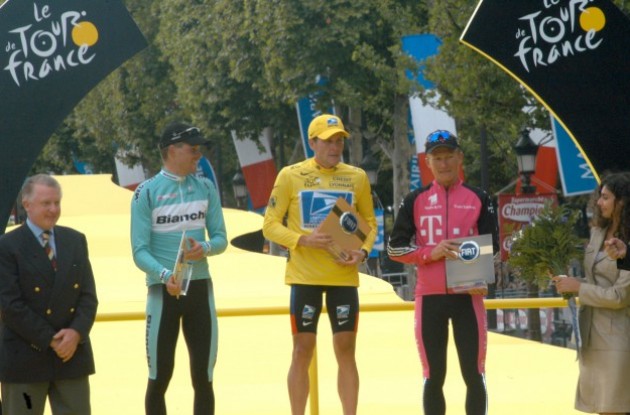On the horns of a dilemma
Let’s say you’re a WorldTour caliber racer. You’ve had a decent season – maybe a win or several top-10 finishes in some big races. However, the team you’re a member of has several riders like yourself on the squad and you feel you could have accomplished more if you’d had some support. So come July your agent starts looking around for other teams to join. Then the USADA report hits like a tsunami and rips through the sport.
The fallout continues and soon not only is Lance Armstrong’s reputation shredded to pieces but numerous other riders’ as well. Not just reputations of active riders, but also reputations of former riders who have now become team directors.
You’ve always considered yourself a clean rider and don’t want to get caught up in the doping scandal, so you look to join a team whose reputation isn’t swirling down the toilet bowl. Who do you choose?
Astana has strengthened their squad with Vincenzo Nibali and Jakob Fuglsang. The lone American on the squad is 22-year-old Evan Huffman. However, stepping off the bike and behind the team car’s steering wheel is Alexander Vinokourov. As you might know previously suspended for blood doping and now under investigation for buying his win at the 2010 Liege-Bastogne-Liege.
Do you look at RadioShack? While they have riders on their team roster and recently signed Stijn Devolder to what must be his last chance at remaining in the World Tour, there is the huge dark cloud hanging over Johan Bruyneel.
Saxo Bank sees the return of Alberto Contador, but team manager Bjarne Riis has come under fire recently. While he has admitted to doping as a professional cyclist he claims that he’s cleaned up since then. That might be the case except Tyler Hamilton’s book, “The Secret Race” states that Riis introduced Hamilton to the infamous Dr. Fuentes. Riis, AKA Mr. 60%, denies ever introducing the two.
Another awkward situation is that a new co-sponsor for Riis’ Saxo Bank squad is Tinkoff Bank. Hamilton also claims that the founder of Tinkoff Bank, Oleg Tinkov, told him and a room full of riders back when the Russian was sponsoring Team Tinkoff Credit Systems they could do whatever they wanted, “Just don’t get caught.” Tinkov denies this claim by Hamilton. Curiously for a man who no doubt has a few lawyers on retainer, he hasn’t done a thing other than posting a snarky comment on Twitter.
Team Sky Procycling seems like a good squad to be a part of. They have a strict anti-doping policy so you can be assured there won’t be any clandestine flights to Madrid to pick up a blood bag. But in their not so distant past they had employed Dr. Geert Leinders who was a doctor for Team Rabobank and is accused by former Rabobank team director Theo de Roy of being part of a medical staff that tolerated doped riders on the team, notably Michael Rasmussen. Leinders’ contract was not renewed for 2013.
Even as recent as last week Team Sky enacted a zero-tolerance policy regarding doping which saw coach Bobby Julich quit followed by the retirement of team director Sean Yates, which he claims had nothing to do with this culling of former dopers.
Anyway, you get the point. There’s hardly a team that hasn’t been touched by or been a part of doping. This leaves riders in a bit of a quandary. Do you sign a contract with a team that’s offering the best money regardless of their history because they all have the stink of doping, or one that looks to be taking the right path to correct the situation? For some riders that might be a tough decision.
It’s easy to take the money and hope for the best when it comes to selecting a team. Sure, Team XYZ might offer you more money and that’s great for the short term, but what about a couple of years down the road? Are there any skeletons in the closet that might come out to bite you in the buttock and thereby ruin your reputation?
Or do you go with what’s behind “door number 2”? It’s a contract that doesn’t have as many zeros on the cheque, but the team has a good reputation. This can be a serious dilemma. But what exactly is a dilemma?
There are several types of dilemmas. The classic “ethical dilemma” is one type of dilemma that many of us have faced – do we do what’s morally correct? As these past months have shown us, many of our “heroes” make poor ethical decisions.
Some riders don’t have the luxury of choosing between two scenarios. Instead they are faced with Hobson’s Choice – take it or leave it. After reading David Zabriskie’s affidavit it seems like he had to make Hobson’s Choice. Either take the miserly fifteen-thousand dollar a year salary or be fired from the Postal Service team.
Reading other riders’ reports it seems like they were almost doomed from the start – a case of Morton’s Fork – there was no correct team to pick as both choices offered were bad. Most or all the teams ran a “program.”
A couple of weeks ago I read an interesting column by Bruce Schneier on Wired.com who opined that Armstrong faced a Prisoner’s Dilemma. Armstrong could either choose to take drugs to have an advantage over the competition that wasn’t taking drugs or Armstrong could take drugs to make sure the competing riders didn’t have an advantage over him. So regardless of what the competition does (takes or doesn’t take drugs), the outcome is Armstrong takes drugs.
Technically a dilemma means having to make a decision between two usually undesirable or unpleasant choices, that’s what the prefix of “di” means: two. Because I’m not a fan of a zero tolerance policy, as it just drives people to be silent rather than addressing the problem so it can be solved, now I’m seeing riders faced with a third option of not doping at all – something that was made clear by Team Sky’s new American signing, Joseph “Joe” Dombrowski.
He was on my video cycling chat show and he talked about how doping isn’t part of the equation. Dombrowski was happy to be a member of Sky. No longer are riders on the horns of a dilemma where both choices are uncomfortable.
Riders are now reviewing option three: clean, respectful racing. However, sadly one disgraced former pro rider sits in his living room surrounded by trophies proven to be won by fraudulent ways. What is his dilemma?
Armstrong is in a zugzwang dilemma. This type of dilemma is typically used in chess and game theory but give me a little latitude to make my point. Zugzwang dilemma basically means being unable to make a move without making an important concession so the best option is to do nothing at all. Armstrong can’t admit to doping as he could go to jail for perjury. If this was chess he’d prefer to not make a move. As I’ve explained in previous articles, going to jail for a cyclist is bad on many levels.
However the zugzwang dilemma is an untenable position. Armstrong can continue this position, but eventually it will fail like it does in chess and it will be checkmate.








